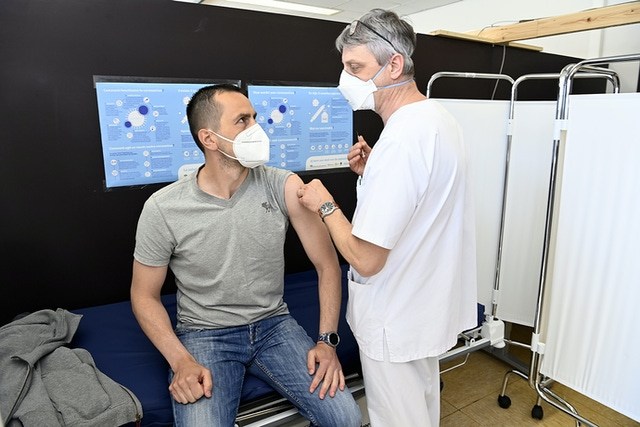Over 60% of coronavirus vaccine doubters who feared getting vaccinated at the beginning of the rollout in Belgium have changed their minds, according to the latest motivation barometer from UGent, UCLouvain and ULB.
By April, the majority of doubters were willing to get vaccinated by April, by which point 18% had already received a first dose, and as many as 79% who said they were hesitant in April were vaccinated in June. The challenge is to determine what makes them change their mind, the study stated.
"A personal meeting with a health professional and offering targeted information are the most appropriate strategies for encouraging doubters to vaccinate, according to refusers, doubters and vaccinated," the results of the study showed.
However, it found that the opportunity to be vaccinated by one's general practitioner was also an effective method to change their minds.
Out of the 100 people who indicated in the survey that they were completely opposed to receiving the doses, 43 are now vaccinated.
Adding pressure
The study found that while vaccine doubters would like others to be patient while they are trying to come to a decision at their own pace, vaccinated people indicated they want to add to the pressure through rewarding vaccination and granting unique privileges to vaccinated people, whilst 56% of people want to make vaccination compulsory.
"There is definitely a discrepancy between what the convinced and the hesitant think," health psychologist Olivier explained.
Whilst 78% of those who were for vaccination favoured guilt-tripping as a strategy, this was only approved by one in ten vaccine doubters.
Related News
- Quarantine after high-risk contact scrapped for fully vaccinated people
- Brussels stops giving AstraZeneca vaccine to new people
"The objective is not to convince those who are already convinced. Rather, we need to give a voice to those who are hesitant and reluctant. This is the problem with current policies. It is mainly people who have been vaccinated who guide the vaccination strategy?" Luminet said.
The researchers recommend that health professionals (family physicians, pharmacists) should be continually engaged to proactively contact citizens and provide them with relevant information about vaccination in a motivating way.
They also warned that the vaccination strategy should no fall into the reward trap, such as material rewards or a vaccination passport with unique privileges used in several other countries, as "employing rewards tarnishes the inherent value of prosocial motivation and creates pressure in doubters that drives them further away from vaccination."
Current state of play
Among the under-35s surveyed, which are now at the heart of the vaccination campaigns in most regions, 82% are either already vaccinated or are very willing to do so.
"Of the people who were very convinced from the start, none refused the vaccination. Once decided, there seems to be no turning back," Vincent Yzerby, professor of social psychology at UCLouvain and member of the Psychology and Coronavirus expert group, told Belga News Agency.
Currently, about 6.4 million people in Belgium (70.2% of adults) already received a first dose of a coronavirus vaccine, while over 3.6 million (39.2% of adults) have been fully vaccinated.
In Brussels, the level of vaccine hesitancy is higher than in other regions, as just 51% of the adult population has been partially vaccinated here, as opposed to 74% in Flanders and 69% in Wallonia and the German-speaking region of Belgium, according to Sciensano figures.

